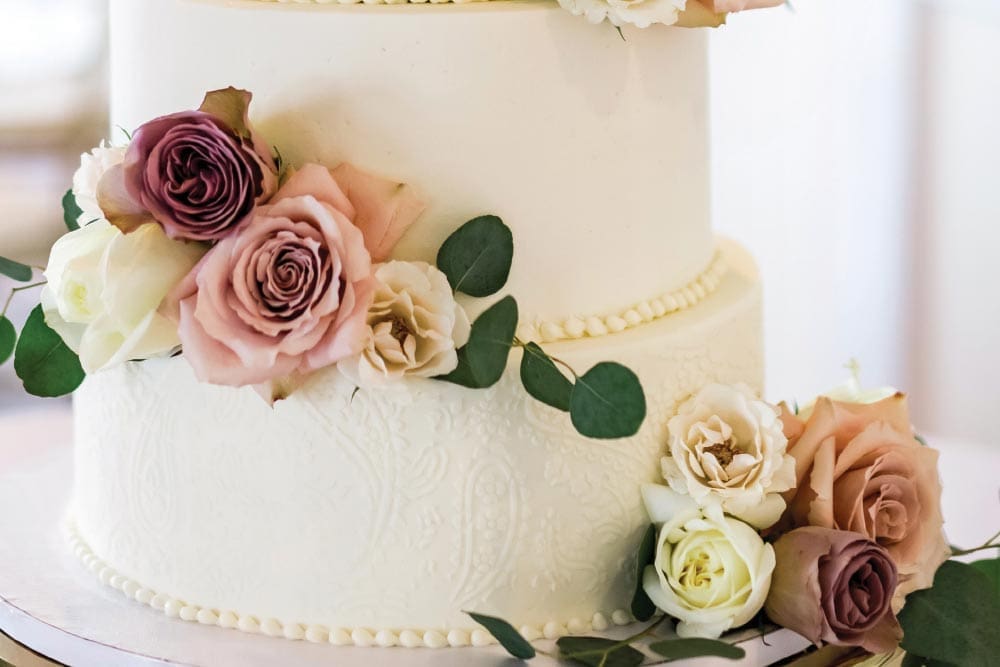How do l… ?

Local experts help you navigate a few of the trickier parts of planning a wedding.
…shorten my guest list, without being impolite?
Even before the COVID-19 pandemic, couples were faced with the challenge of trying to keep their number of guests at a manageable level.
According to Donna Radford of Creative Joy Event Solutions, wedding etiquette says that unless a guest is explicitly listed on the address line or the RSVP card, your wedding attendees shouldn’t assume they can bring one. Allowing an attendee to bring a guest is considered a “plus one.”
“Take some time to discuss and agree on a plus-one policy with your significant other and any event decision makers to make sure everyone is on the same page,” she says.
“You don’t want your parents or future in-laws allowing plus-one guests when you’ve been denying them to folks approaching you directly.”
An example of a plus-one policy could be that all married or engaged couples are allowed to bring a guest, but those who are single or dating someone cannot.
Address invitations clearly by including “and guest” on envelopes, and design your RSVP cards to list the total number of guests that the one invitation represents. Finally, create a page on your wedding website to describe your plus-one policy. “This can be a good way to avoid difficult conversations if you don’t like having them,” Radford says.
Her rule of thumb for large or extended families, one of the most difficult guest list challenges, is this: “If you haven’t spoken with someone for more than two years, they probably aren’t a big part of your life and should be excluded from the guest list. This methodology doesn’t work for everyone, but when your aunt asks why some cousins were invited over others, you can let them know confidently.”
…book a block of hotel rooms?
If you expect to have a good amount of out-of-town guests, reserving a block of rooms at a hotel is a must.
First off, don’t book all of the rooms online by yourself. Michelle Feitshans, director of sales and catering at the Craddock Terry Hotel, says couples should call the hotel and ask for the sales department to get a discounted rate. The hotel will then send a contract to the couple. “Always read the fine print on the contract. Changes can be made before a clearly stated cut-off date,” she says, adding that unused or unpaid hotel rooms are typically released about 30 or 45 days before the wedding weekend.
In terms of how many hotel rooms you need will again depend on the number of out-of-town guests and the size of the hotel property. But Michelle says hotels will usually start with a block of 10 to 20 rooms per night.
She also says to keep in mind that group rates can fluctuate depending on the time of the year and if there are any big events going on in town that weekend. “High demand weekends, the rates are going to be higher,” she says.
If you hold your wedding reception or rehearsal dinner at the hotel, you may be able to negotiate a lower rate for your hotel rooms, which your guests would surely appreciate. Michelle also recommends booking a couple of different hotels to accommodate different traveling budgets.
It’s also very important, if you aren’t familiar with a hotel, to do a site visit before signing a contract. “You want to make sure your wedding guests will be comfortable and that it’s the right vibe for your friends and family,” says Michelle.
…avoid costly contract mistakes with my venue?
Planning a wedding was always challenging—the COVID-19 pandemic only added to the chaos, with constantly changing guidelines. Many weddings had to be postponed or majorly scaled down, and some couples learned the hard way that venue contracts are a serious matter.
The best way to avoid costly contract mistakes is to hire a reputable wedding planner, says Radford: “The experience and contract review from an industry professional can be comforting.”
But if a wedding planner is not in the budget for you, she shares a few more pieces of advice:
• Make sure your venue has a clear postponement and cancellation policy and don’t forget to get it in writing.
• Don’t sink a ton of money into a venue up front. “Request a reasonable payment plan that makes you regularly evaluate the validity of your plans with the pandemic in mind,” she says.
• Seek out a venue with ample space to allow for social distancing. “Our rule of thumb is to make sure the venue can fit double the amount of guests you plan to invite. If you’re inviting 50 guests, find a venue with space for at least 100.”
• Try to find a venue that checks multiple boxes at once to avoid signing contracts with many different vendors. “If the venue provides tables, chairs, and some other rentals, that’s a plus. Working with rental companies is more expensive than you think,” she says. “If the venue sources alcohol and provides bartenders, that’s also a benefit.”
• Pay close attention to an in-house caterer. “When a venue has
in-house catering or a short list of preferred caterers you must choose from, make sure you fully understand the menu possibilities and cost of the caterer prior to signing a contract with the venue. It might seem like a lot of work to do prior to booking, but you will avoid surprises that, in extreme cases, could add up to a down payment on a house.”













